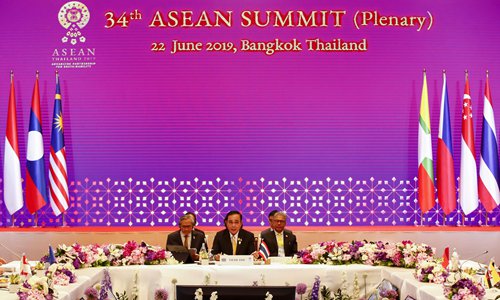ASEAN Outlook on Indo-Pacific underscores role of organization in regional dynamics
By Cheng Hanping Source:Global Times Published: 2019/6/30 17:58:41

Photo: IC
The 34th ASEAN summit hosted by Thailand from June 20 to 23 came at a time when the geopolitical environment in the region was on a simmer with the US throwing its weight behind the Indo-Pacific Strategy. ASEAN countries reached an agreement on the ASEAN Outlook on the Indo-Pacific, implying the bloc has entered a very important stage. The summit was held when trade tensions between China and the US were still brewing. Therefore, developments during the summit merit interpretation.
Prior to the opening of the summit, rotating chairman and Thai Prime Minister Prayut Chan-o-cha who recently renewed his term of office, made a public appeal to member countries, urging them to conclude the Regional Comprehensive Economic Partnership (RCEP) negotiations proposed by China by the end of this year. He said, "This will help ASEAN handle the changes and uncertainty that will happen in the region going forward, particularly the impact of trade tension between ASEAN's important trade partners." Obviously, the China-US trade friction not only flummoxed ASEAN but also increased its sense of crisis and urgency.
The RCEP referred to by Prayut is believed to be replacing the Trans-Pacific Partnership that the US has withdrawn from. The agreement involves all member countries of ASEAN, as well as nations outside the region - India, Japan, South Korea, Australia and New Zealand, totaling 16. If adopted, the RCEP will result in the largest trade bloc in the world.
Before the summit, the ASEAN Outlook on the Indo-Pacific drafted by Indonesia aroused heated discussions among ASEAN stakeholders. The initial intention of the Indonesian government was to underscore the "free and open Indo-Pacific" concept advocated by Japan and the US as well as China's promotion of the Belt and Road Initiative. ASEAN, caught in the middle, should play a leading role in the region.
One goal of ASEAN is to become an important strategic partner in cooperation with all parties in the future, whether it be the US or China, in order to enhance the geopolitical influence of the organization.
Second, dialogue and cooperation are important in the complex geopolitical context to avoid any form of future conflict and confrontation, especially against the backdrop of maritime territorial disputes in the region.
The third goal is to strive to make Southeast Asia a peaceful, safe and prosperous region, bring benefits to people, and ensure ASEAN's sustainable and rapid development is not affected by China-US trade rows.
Fourth, ASEAN showed a united stand by reaching an agreement on the ASEAN Outlook on the Indo-Pacific, for which Prayut praised members states and called it a "significant step" for the region.
Negotiations on the Code of Conduct (COC) in the South China Sea are another highlight of the summit. Leaders of ASEAN members released a statement on June 23, declaring that the bloc was negotiating with China in a pragmatic manner and making serious efforts to complete the consultation on the COC, which "could reduce tensions and the risk of accidents, misunderstandings and miscalculation."
The statement added, "We warmly welcomed the continued improving cooperation between ASEAN and China and were encouraged by the progress of the substantive negotiations toward the early conclusion of an effective and substantive Code of Conduct."
According to a Thai foreign ministry spokesman, the first reading of the COC, scheduled to be completed by 2021, is likely to be finished by the end of this year. This progress just reflects increased mutual trust between China and ASEAN on the South China Sea issue. As long as interference by external forces is ruled out, China and ASEAN will surely take the path of win-win cooperation, because both sides have unanimous aspirations of building a community with a shared future.
It is worth noting that the ASEAN Outlook on the Indo-Pacific also emphasizes that member countries should conduct maritime cooperation for the peaceful settlement of disputes and improve communication and cooperation in the Indo-Pacific region, which is in line with China's views on the South China Sea issue.
The author is a senior research fellow and professor of the Collaborative Innovation Center of South China Sea Studies at Nanjing University, and president of Southeast Asia Research Association of Jiangsu Province. opinion@globaltimes.com.cn
Posted in: WORLD FOCUS